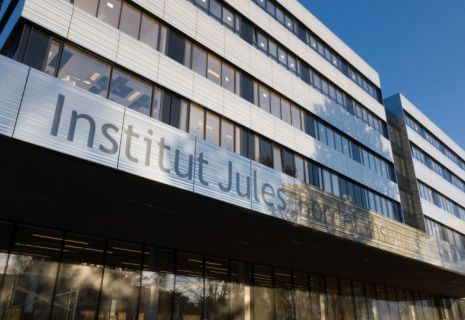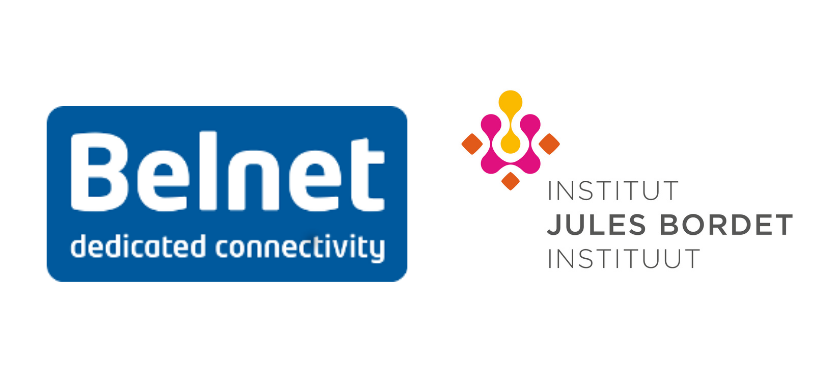In a context of increasing digitalisation, the teams of Philippe Hennebert (IT Director - Institut Jules Bordet) and David Lerens (IT Support Manager for the Clinical Trials Support Unit) play a key role within the Institut Jules Bordet. On the eve of a landmark move, they talk about the role of IT in research, the various challenges linked to the crisis and their long-standing collaboration with Belnet.
In November 2021, the Institut Jules Bordet will prepare for a small revolution. The Institute, currently located at Porte de Hal, will move to a brand new 80,000 m² building located on the same campus as the ULB Faculty of Medicine, next to Erasme Hospital in Anderlecht. This move will mean a more than 50% increase in treatment capacity and the formation of a geographically consolidated research structure (clinical, translational and fundamental).
Philippe Hennebert explains, "In close collaboration with the ULB and Erasmus laboratories, the research laboratories will be restructured around four main areas: solid tumours; immuno-oncology; haematology, physics and medical engineering - supported by transversal platforms primarily involving bio-informatics; and artificial intelligence.

© Archi 2000 and Brunet-Saunier
Moreover, for both research and care, our move will lead to the overall modernisation of our infrastructure and the digitalisation of a number of activities (operating theatre, radiotherapy, etc.)."
"This move is an undeniable boost for the Institute's development, and IT is playing an increasingly important role in care, clinical research and also in fundamental cancer research."
"The Institut Jules Bordet has a history, and an identity in which care and research have always been closely linked." (Philippe Hennebert)
In addition to providing patient care and training new doctors, the Jules Bordet Institute is an important player in cancer research. The Brussels academic hospital's mission is to prevent, detect and fight cancer. It is the only hospital in Belgium to be accredited by the O.E.C.I (Organisation of European Cancer Institutes). "The Institut Jules Bordet has a history and an identity in which treatment and research have always been closely linked. It is the same doctors, the same teams that deal with both treatment and research."
"Integrating research into the hospital's operations is fundamental. We would like to translate this into IT by reusing data, as long as this is legally and ethically possible," explains Philippe Hennebert.
Data collection applications for research
David Lerens is the IT Support Manager for the Clinical Trials Support Unit (CTSU-IT), an operational unit supporting academic clinical research for all types of cancer.
Traditionally, patient data in clinical studies is collected through CRFs (Case Report Forms). CRFs have gradually become fully electronic over the past 20 years, and the CTSU-IT has been part of this change. "Data is collected by applications in the form of CRF forms," explains David Lerens. In addition to the CRFs, various tools have been developed internally. These are intended primarily to help the research teams decide on the eligibility of a patient according to the study's selection criteria, to monitor the samples and their analysis results and to list any adverse reactions to the therapy.
This is how IT contributes to the clinical research organised by the Institut Jules Bordet. This involves supporting major clinical trials aimed at demonstrating the effectiveness of new treatments, as well as better targeting treatments or better adapting treatments to individual situations, for example in the Decrescendo study - reducing the arduousness of chemotherapy for certain breast cancer patients.
A year ago, the CTSU-IT team implemented an ePRO (Patient Related Outcome) application for certain clinical studies. "This type of application allows the patient to talk, obtain information and become involved in their own treatment pathway. It also allows us to gather information more easily, especially concerning side effects."
"IT plays an increasing role in clinical research, and in basic and translational research into cancerology" (Philippe Hennebert)"
The IT applications developed for research are also very interesting for studies with a very large number of patients. One example is the Aurora study into metastatic breast cancer. Significant technological resources were used to analyse the molecular characteristics of certain recurrent or metastatic breast cancers in more than 1,000 patients.
"The use of these technologies to facilitate data collection is a task that falls to the IT teams. IT plays an increasing role in clinical research, and in basic and translational research into cancerology," concludes Philippe Hennebert.
The start of the COVID-19 crisis: Philippe Hennebert recalls the many challenges encountered and the role played by Belnet
"From March 2020 onwards, it was difficult for the research teams when the hospitals were very busy. Our teams had to focus on the priorities and so treatment that was deemed less urgent, as well as recruitment for some clinical studies, had to be slowed down."
"Like all companies, and especially hospitals, we experienced a shift towards increasing digitalisation." (Philippe Hennebert)

© Marc Detiffe (detiffe.com)
"Digitalisation and automation procedures have been put in place in our interactions with federal (Sciensano) and regional structures, particularly for data transmission and reporting. In addition, in collaboration with the health networks, we were one of the first hospitals in Brussels to start notifying patients of their COVID-19 test results via a link sent by text message to the secure site of the regional platform. Generally speaking, like all companies, and especially hospitals, we experienced a shift towards increasing digitalisation."
Teleworking for doctors"Another challenge was in organising teleworking. A number of doctors have had to telework, particularly due to quarantine. Continuity of care had to be ensured with a high percentage of remote doctors. This meant that we have had to regularly review our consultation procedures. In addition, multidisciplinary oncology consultations, which are at the heart of the treatment decision for cancer patients, had to be held virtually."
"Belnet has provided us with internet connectivity all throughout this period.” (Philippe Hennebert)
"We have also had to increase our licences and capabilities across the board to enable a huge number of people to telework."
Patient isolation"Lastly, we had to adapt to allow patients to maintain contact with the outside world at a time when visits were absolutely forbidden, and this relied heavily on the IT infrastructure and our connectivity."
Belnet's role during this period"Belnet provided internet connectivity that stayed with us throughout this period when the consumption profile and traffic experienced quite unprecedented variations. A good IT infrastructure is one that is invisible, one that users don't talk about. In fact, we never had to worry about these issues because of the bandwidth reserve that Belnet gave us," concludes Philippe Hennebert.

Belnet, a partner for over 20 years
"Belnet provides us with internet connectivity for more than 20 years now," explains Philippe Hennebert. "This is the service we primarily use. It is an essential service. As well as the provision of certificates and a number of security-related services."
"In addition to internet connectivity, we use different levels of connectivity, including our fast connection to academic and research centres. For heavy DNA sequencing data, for example, this connectivity is very useful for transfers to the ULB computer centre or other institutions that depend on Belnet. We are not yet using Belnet's storage platforms, but further collaboration could be considered in this area."
Belnet's DNA: serving the research network"With the increasing digitalisation and new challenges in terms of data usage, artificial intelligence and patient contact, having the IT support of service providers like Belnet is very important for a hospital like ours that is part of a research network."
"Belnet is extremely transparent and professional compared to commercial providers." (Philippe Hennebert)
Philippe Hennebert believes that Belnet should not change too much. "Belnet's core mission is to serve Belgian research institutions and this is really something that remains fundamental for us. Belnet is extremely transparent and professional compared to commercial providers. This does not make us immune to everything, as we know very well from the events of the last few months. But what we really appreciate is the transparency in communication."